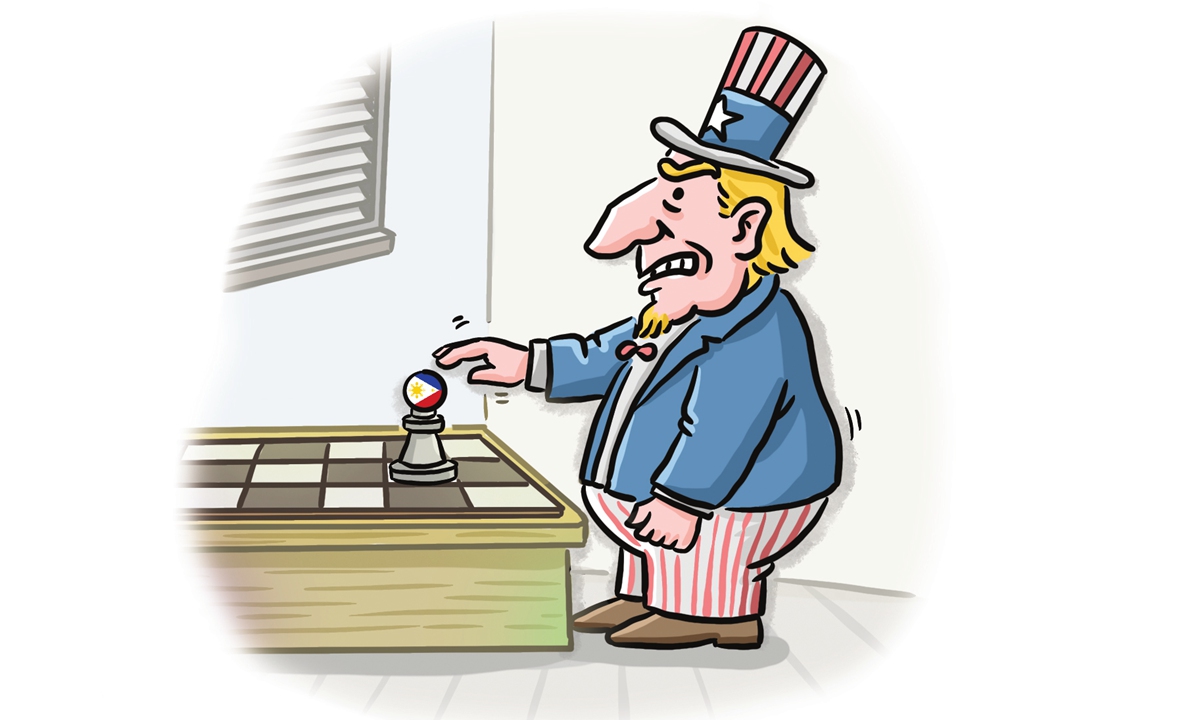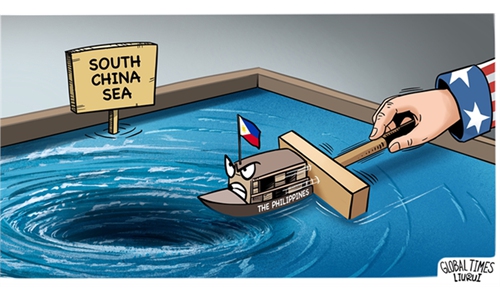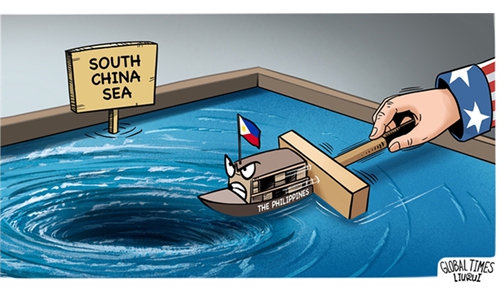
Illustration: Xia Qing/GT
Editor's note:
The escalation of the China-Philippine tensions raises concerns among regional countries in the South China Sea. How will the Philippines' provocations, instigated and supported by the US, affect the situation in the South China Sea in 2024? How do ASEAN member countries perceive the South China Sea tensions? Why do they hope that the situation will be contained?
In our "ASEAN Perspective on the South China Sea" series, we collect wisdom and insights from former diplomats and scholars from ASEAN member countries. Maria Lourdes Tiquia (Tiquia), founder and CEO of the Philippine think tank PUBLiCUS Asia, shared her insights with Global Times (GT) reporter Ma Ruiqian. She noted that the Philippines cannot be a proxy in any war the US wants to pursue in any place in the world.
GT: Analysts have warned that the Philippines inviting external forces to become more involved in the South China Sea could further heighten maritime risks and jeopardize regional stability. How is the situation in the South China Sea being disrupted by US factors?
Tiquia: I believe that non-regional countries should act as neutral players in the negotiations instead of active and involved players. On the South China Sea issue, open dialogue should be pursued and backroom negotiations maintained on the non-negotiable issues. Nonviolence should always be part of the effort to reconcile differing views and positions. Claimants should not rush to resolution. They must find common paths where they can work together on projects that strengthen cooperation and collaboration, thus ensuring a win-win goal.
GT: US President Joe Biden, Japanese Prime Minister Kishida Fumio and Philippines President Ferdinand R. Marcos Jr recently held a trilateral summit in the US, the first trilateral US-Japan-Philippines leaders' summit. We noticed that they mentioned the security issues in the Taiwan Straits in their joint statement. Is it wise for the Philippines to get involved in the Taiwan Straits security?
Tiquia: Taiwan is not an issue the Philippines should intervene with. We have no issues in and with Taiwan. Our diplomatic relationship is with the Chinese mainland.
GT: Some experts believe that the US hopes Japan and the Philippines will take on the role of "co-sheriffs" in its dominant Asia-Pacific alliance system. Do you think the Philippines is truly prepared to risk future conflicts with China?
Tiquia: The change in the constitution of Japan has allowed it to be more active internationally. But the Philippines is not Japan. The Philippines cannot take on the role of a "co-sheriff" for the following reasons: We are not a geopolitical power; we lack almost all equipment and means to do so; our culture is one of non-instigators when it comes to war; currently, our economy is not in the best health and we do not have a policy of conscription in the military.
Our primary asset is our geographical location. The sudden pivot by Philippine President Ferdinand Romualdez Marcos Jr with the nine Enhanced Defense Cooperation Agreement bases does not bode well for my country since there was no consensus on this sudden shift at either the local or national levels. However, in the Philippines the sole architect of foreign policy is the president, but to declare Martial Law and to go to war, congressional approval is needed.
GT: How do you view the relations between the US and the Philippines? If there were a conflict between China and the Philippines, would the US help the Philippines?
Tiquia: I do not agree that the Philippines is a vassal state of the US. It is an independent state. Hence, we cannot be a proxy in any war the US wants to pursue in any place in the world. Why? Because the Philippines loses operational control in case of a war. We should not expose Filipinos to a war not of our doing. Instead, the Philippines should reduce escalation and the spiraling political will contest.
The Philippines is not prepared to bear the risks internally and with its economy for any war. In any conflict with China, the US will come to our aid if, and only if, a soldier is killed. Shouldn't mutual defense be a protection to prevent war instead of upon the killing of a Filipino soldier? And the processes of the mutual defense treaty do not speak of the death of anyone because it must go to Congress before the US can come to our aid.


